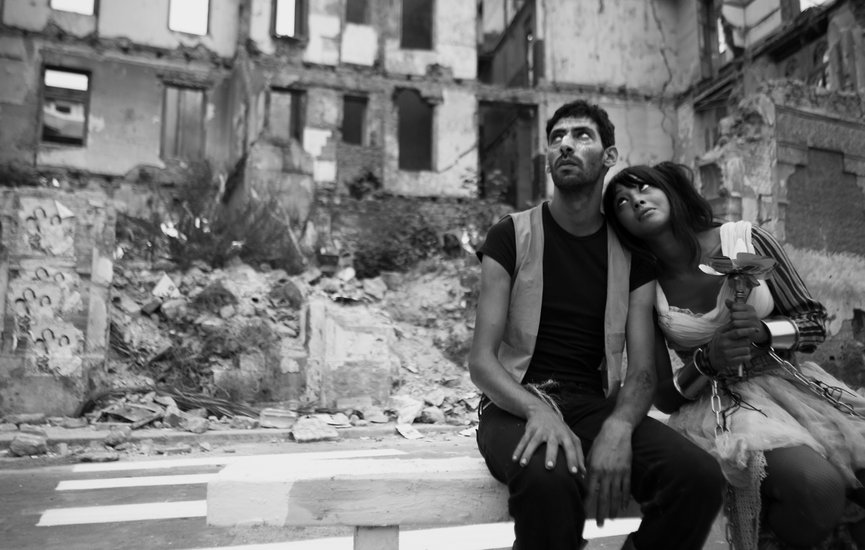Marrakech – Hicham Lasri doesn’t take the safe route. The playwright, novelist, comics artist, and filmmaker builds his films like Molotov essays: compact, mischievous, and disruptive. From Cannes’ ACID to Berlin’s Panorama and Forum, his work consistently revisits Morocco’s most difficult spaces -memory, authority, shame-and rearranges them.
This year, as president of the national jury at the Marrakech Short Film Festival (MSFF), Lasri’s focus shifts to the next generation of short-form storytellers, in a city that screens films beneath the stars and turns it into a civic ritual.
Born in Casablanca in 1977 and also known by the pseudonym “Daddy Desdenova,” Lasri reflected on his craft, risk-taking, and why short films remain Morocco’s most agile mirror.
The filmmaker, whose punk-toned social satires have been repeatedly selected at Berlinale and ACID Cannes, brings a formidable artistic background to the festival. At this stage in his career, he is working on his ninth feature film while continuing to make countless short films. With 14 novels and seven graphic novels published, he brings a truly multidisciplinary perspective to Moroccan cinema.
Lasri’s cinematic journey spans more than a decade, beginning with his 2012 debut The End (ACID Cannes), followed by They Are the Dogs (2013) and The Sea Is Behind (2014). He developed a regular presence at Berlinale with Starve Your Dog (Panorama, 2015), Headbang Lullaby (Panorama, 2017), and Jahilya (Forum, 2018). More recent works include Moroccan Badass Girl (2024), which premiered at the Marrakech International Film Festival in 2023, and Thank You Satan (2025), produced by Lamia Chraïbi and featured at Rotterdam.
His literary output includes Stati© (2010), Sainte Rita (2015), L’improbable Fable de Lady Bobblehead (2018), L’effet Lucifer (2021), and Big Data Djihad (2023). His latest film, Cloud Cowboys (2025), is an Arabo-futuristic vision where water becomes memory, tenderness a luxury, and hope the last surviving resource.
As a playwright, Lasri has staged works including (K)Rêve! (2006), ZemZem (2008), and Les Invisibles (2017). In the world of graphic novels, he has authored Vaudou (2015), Fawda (2017), and MaRRoc (2019).
The evolution of Moroccan short films
Lasri belongs to a generation that valued short films immensely, especially when they were still shot in 35mm. He made his first short in 2001–2002, describing it as a complicated but pure process: “Everyone worked for free, there were no transactions.”
He criticizes how later regulations, which required production companies to make three short films, opened the field to opportunists with little creative vision. “Current short films in Morocco, with few exceptions, have been contaminated,” he argues, claiming passion has been replaced by financial opportunism.
For him, short films remain noble because they allow filmmakers to reset, experiment, and “avoid becoming calcified, old, repetitive.”
Digital innovation and authentic vision
Lasri highlights how digital tools and lighter cameras have changed filmmaking, insisting that young filmmakers must reflect today’s world rather than replicate outdated formulas. “We can’t make short films as if we were in the 1960s. We’re in 2025, almost 2026.”
He criticizes young directors who make “old people’s films” — safe, conventional works lacking innovation or risk. Instead, he calls for short films that “carry the DNA of youth,” challenging norms with unique visions.
Comedy as subversion
Known for his edgy approach, Lasri sees cinema not as something that unites but as something that provokes dialogue. Dark comedy and satire are central to his style, helping him avoid both victimization and empty glorification in Moroccan storytelling.
For him, dignity lies in portraying humanity with flaws rather than selling stereotypes or mimicking Western models.
Artistic integrity vs. commercial pressure
Lasri insists that cinema’s true value is artistic, not commercial, and warns against becoming a mere cog in the system. He praises raw, amateur creativity as more vital than professional cynicism: “Cinema needs love, not professionals. In ‘amateur’ there is ‘love,’ and we need love.”
He recalls experimenting with short societal videos years before TikTok became mainstream, lamenting that despite Morocco’s abundance of comedians, humor today lacks courage and sharpness.
Festival as cultural incubator
Marrakech, long a hub of storytelling, is now home to the MSFF, founded during the pandemic to revive communal cinema experiences. Running September 26–October 1, 2025, the festival showcases national and international competitions, with screenings in historic venues like Palais Bahia, Palais Badi, and Arsat Moulay Abdeslam.
For Lasri, such festivals are vital not just for promoting creation but for confronting filmmakers with public audiences. “It will make them want to do better,” he says.
Filmmaking, he insists, is like sport: “It’s not something you improvise. You have to be patient, build yourself up enough to be relevant.” The process requires sincerity, persistence, and above all, hard work.
